As marijuana becomes legal and more normalized in Minnesota, cities are responding in different ways. While some are cautious or even opposed, others, like Elk River, see it as an opportunity to bring in money and keep the industry accountable.
Elk River is one of 13 Minnesota cities looking into opening a city-owned cannabis store—a first-of-its-kind idea in the U.S. Unlike privately owned dispensaries, these municipal cannabis stores would be run by the local government, similar to how some cities already manage their liquor stores.
Elk River City Administrator Cal Portner said the city isn’t necessarily excited about cannabis legalization, but they’re accepting the reality and want to make the best of it.
“It’s not about enthusiasm—it’s about recognizing what’s legal now and managing it well,” Portner explained.
Building on Liquor Store Success
Elk River already runs two city-owned liquor stores, which bring in nearly $1 million in profits each year. These profits go directly into the city’s budget instead of being sent to out-of-state corporations.
Portner believes the city can apply the same model to cannabis. He pointed out that the city’s liquor stores always pass compliance checks for age restrictions on tobacco and alcohol. With that experience, he’s confident they can safely and responsibly manage cannabis sales as well.
Minnesota has 176 cities operating liquor stores, which collectively earned $31.6 million in profits in 2023. Even small towns benefit—some making $10,000 a year. That may seem minor, but in small communities, it can make a real difference, said Paul Kaspszak of the Minnesota Municipal Beverage Association.
Starting Small with Cannabis
Revenue from cannabis won’t come immediately. An estimate for Elk River projected a loss of about $185,000 in the first year due to upfront costs like inventory, marketing, staff training, and setting up the store. Still, officials believe profits will come with time.
Some cities like Elk River are planning to combine cannabis sales with existing liquor stores. Elk River’s cannabis section may be branded “Cannabound,” while the liquor side will continue under its current name, “Northbound.”
Other cities that have applied for cannabis licenses include St. Joseph, Owatonna, and Byron. Many are still waiting for final approval from the state’s Office of Cannabis Management (OCM). In Byron, city officials made it clear that applying for a license doesn’t mean they’re locked into opening a store—it just keeps the option open.
Not All Cities Are On Board
While some cities are preparing to enter the cannabis business, others are hesitant. For example, Albert Lea recently blocked a privately owned cannabis store from opening, even though that may go against state law. City leaders there said they needed more time to review concerns about enforcement and liability.
Many other cities have taken a middle-ground approach by creating zoning rules that control where cannabis stores can open and how many can operate. However, unlike liquor stores, cities with municipal cannabis shops cannot ban private cannabis businesses entirely. The state law prevents any one city from having a cannabis monopoly.
A New Chapter
While municipal cannabis stores are a new idea in the U.S., Minnesota’s long history of successful city-owned liquor stores gives some confidence that this model could work. If it does, it could offer communities a way to keep profits local, ensure responsible operations, and invest back into their neighborhoods.
As Portner said, “It’s not just about selling cannabis—it’s about doing it right and making it work for the community.”


